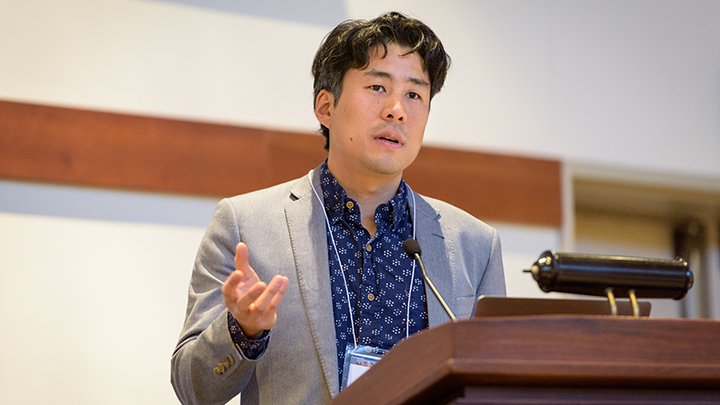Summit for computer science education
Source: Diane Kukich
 Event attracts state leaders, teachers, administrators, industry partners
Event attracts state leaders, teachers, administrators, industry partners
More than 75 teachers, administrators, business partners and state leaders convened at the University of Delaware on Thursday, March 23, for a daylong conference on computer science education.
In welcoming the attendees, State Rep. Paul Baumbach, who holds a degree in computer science from UD, acknowledged the importance of education in this field by pointing out that Delaware has more than 2,000 job openings for people who know how to code.
“My computer science courses taught me how to solve problems — that’s a skill that will be valuable to students in all of their classes,” he said. “You’re helping them build a base that they’ll be using for the rest of their lives.”
Kathy McCoy, chair of UD’s Department of Computer and Information Sciences, agreed.
“We need computer science in everything we do today, and the skills our students gain are needed everywhere,” she said. “Computer science is one of the most transferable occupations, offering limitless opportunities, high pay, and great job satisfaction.”
Keynote presentation
Keynote speaker Pat Yongpradit, chief academic officer for Code.org, shared information about the nonprofit’s education and advocacy activities.
In addition to organizing the annual Hour of Code campaign, Code.org provides a range of free, adaptable curricula for K-12 computer science. Yongpradit provided highlights of the K-12 Computer Science Framework -- a high-level guide for states, districts and organizations implementing computer science education.
“The framework codifies what kids should learn about computer science, and it’s being used to create standards,” he said. Within the framework, education at the elementary level is aimed at computer science fundamentals, while middle school education focuses on discoveries. At the high school level, the framework targets a deeper understanding of computer science principles as represented in a new Advanced Placement course.
Yongpradit was followed by Luke Rhine and April McCrae with the Delaware Department of Education, who discussed the Delaware Pathways Project, a vehicle to ensure that all youth have the opportunity to fulfill their educational goals and career aspirations. Delaware Pathways has programs that match Delaware’s job needs, including 12 critical, in-demand areas. Of those areas, information technology is second only to health science in need and offers the highest salaries.
Parallel sessions
Parallel sessions at the event covered a broad range of topics. For instance, Delaware teachers discussed ways in which they incorporated computer science in existing school curricula and disciplines at the elementary, middle and high school level. A panel of industry representatives discussed the role of computer science in a variety of STEM fields from data science to health care. Other sessions focused on diversity in the field of computing and professional development and networking events for Delaware teachers.
Summit impact
“One of the biggest outcomes of the Summit was the opportunity to bring CS teachers throughout the state together,” said Lori Pollock, Alumni Distinguished Professor of Computer Science at UD. “There is typically one CS teacher in every school, and thus they are typically isolated.
“A key to success in broadening participation of our youth in creating through computing is building a network where teachers can share what worked with their students,” she continued.
“Many of the teachers working to integrate computer science into their classrooms are math, science, technology or business teachers willing to take on the challenge of a new field for them. I was energized by listening to these teachers leading the charge.”
According to Chrystalla Mouza, associate professor in UD’s School of Education, “The Summit exemplified our commitment to build partnerships with policy stakeholders, districts, schools and teachers to improve opportunities and educational outcomes for students in our state, particularly those traditionally under-represented in STEM fields.”
In a survey completed at the end of the event, 99 percent of the respondents indicated that they are interested or very interested in attending similar events in the future.
About the Summit
The summit was hosted by Partner4CS and the Delaware Department of Education and supported by the National Science Foundation and the Delaware Office of Economic Development.
About Partner4CS
Partner4CS is a program funded by two NSF grants to Lori Pollock, Terry Harvey and James Atlas of UD’s Department of Computer and Information Sciences and Chrystalla Mouza of the College of Education and Human Development. Partner4CS works in accordance with the goals of CS10K and Computing in the Core, two nationwide programs that are increasing participation in computer science among K-12 teachers and students. Major efforts include a paid professional development institute each summer for Delaware middle and high school teachers and a college fieldwork course at UD in which undergraduates assist in teaching computer science in local middle and high schools. Partner4CS also offers academic-year workshops to allow teachers to learn from each other’s efforts and online teacher support for those teachers taking the step to create a curriculum with integrated computer science principles.
About the keynote speaker
Pat Yongpradit is chief academic officer for Code.org, a nonprofit dedicated to expanding access to computer science and increasing participation by women and underrepresented minorities. He has inspired a number of students to enroll in computer science. He is devoted to having every school and student in the United States experience computer science. His dedication has doubled the enrollment of students in his school’s computer science program and has encouraged several to continue computer science as a career.
| }
|